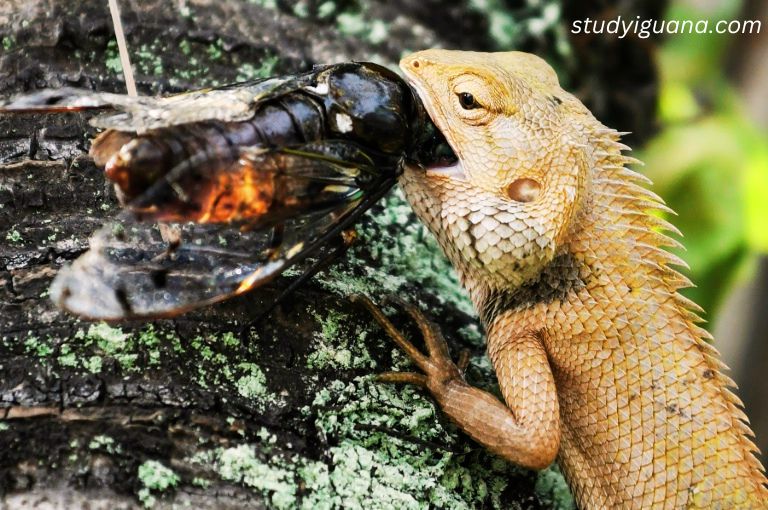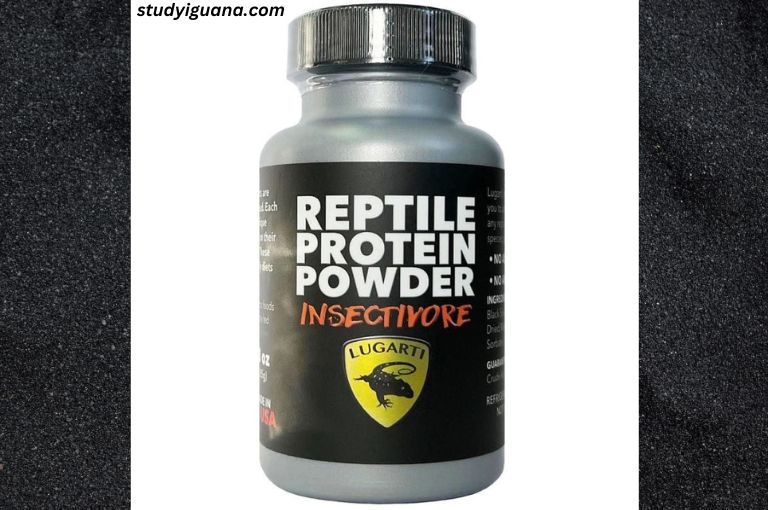Can iguana eat crickets? This question often arises among pet owners curious about their reptile’s dietary needs. Iguanas can safely eat crickets and other insects. Contrary to poisonous plants, these won’t do you immediate harm. But they could become a problem down the road. Iguanas require a varied diet, and if you only ever feed them crickets, they won’t obtain the vitamins and minerals they need. In the following content, can iguanas eat crickets or not is briefly discussed.
Iguanas have been known to eat crickets and other insects, but this is a rather rare occurrence. In most cases, it’s safe to give them a modest amount. However, they benefit the most from plants, leaves, and flowers. They are optional and should be treated as such if crickets are provided for them. Hence, the answer to “can iguanas eat crickets” cannot be simple yes or no.
Can iguana eat crickets? is a common question, especially for those new to reptile care
However, a credible debate is given in the following. Iguanas do great without crickets, which is why most people don’t feed them to them. Iguanas are insect-free creatures that follow a strict vegetarian diet.
Unfortunately, iguanas generally don’t get enough phosphorus, vitamin D, and calcium since their diets are inadequate.

What Happens If Iguanas Eat Too Much Protein?
Too much protein in an iguana’s diet can lead to a number of health issues. Iguanas obtain the majority of their nutrition through fermentation. This is not an effective method of meat digestion. Gout is uncommon in iguanas, although a high-protein diet can bring it on. Dehydration and renal failure are two other potential complications. Nonetheless, a lizard’s diet high in protein is the most common cause of these symptoms. Malnutrition is one of the more common results. If you give your iguana a diet consisting solely of crickets, the lizard is likely to develop nutritional deficiencies. If you’re wondering, Can iguana eat crickets?, it’s important to know they should not be a staple food.
Pet iguanas should be fed only organic, pesticide-free produce. Flower shops and gardening centers both sell edible flowers that can be grown at home. Iguana owners can acquire free, outdated flowers that florists are discarding. Make sure the flowers haven’t been treated with any chemicals before offering them to your iguana.
Are animal-based protein foods appropriate for my iguana?
Many people wonder, Can iguanas eat crickets, or should they stick to a plant-based diet? Protein-rich animal-based items, such as crickets, mealworms, pinky mice, tofu, and hard-boiled eggs, shouldn’t make up more than 5% of an adult iguana’s overall diet. Young, developing iguanas can obtain as much as 10% of their protein from meat. When it comes to diet, iguanas should steer clear of dog and cat food, as it typically contains too much protein, vitamin D, and fat. Can iguana eat crickets? highlights the need to understand their herbivorous diet requirements.
What is protein diet? Can Iguana Eat Crickets?
While exploring what iguanas can eat, one might ask, Can iguanas eat crickets? Although many might disagree, iguanas should not be fed animal protein. As long as you don’t force crickets onto an iguana, it’s probably fine. Iguanas are herbivores, so you don’t have to worry about feeding them anything like insects. First and foremost, make sure your iguana gets a balanced diet rich in calcium and other essential nutrients. When asking, Can iguana eat crickets?, remember their primary diet consists of leafy greens, not insects.
The calcium content of crickets is increased by the addition of calcium dust, so some iguana owners feed their pets calcium-dusted crickets once a week. But as we’ve established, iguanas shouldn’t be fed insects or anything else high in animal protein.
In short, can iguanas eat crickets or not? It depends upon what you’ve been already feeding them.

Do I need to give my iguana vitamin and mineral supplements?
How much and what kind of vitamins iguanas need appears to vary with age. Calcium is more important than phosphorus for iguanas of all ages. Calcium powder formulated specifically for reptiles (calcium carbonate or gluconate) and free of vitamin D and phosphorus is what most veterinarians recommend for lightly dusting a growing iguana’s food every other day (4-5 times).
a week).
The query “Can iguanas eat crickets?” highlights the importance of understanding an iguana’s specific nutritional requirements. Whether or not iguanas can obtain vitamin D from the food they consume is a topic of some debate (they may only be able to use the specific form of vitamin D made in their skin in response to UV light). Many young, developing iguanas don’t get enough ultraviolet (UV) light from indoor environments to produce enough vitamin D to keep their bones healthy. Getting a multivitamin supplement with vitamin D twice weekly is what most veterinarians advise for young iguanas. If you wonder, Can iguana eat crickets?, understand that insects are not essential to their diet.
If you want to be sure your iguana takes its supplements, dust them onto a little amount of salad or moist food before feeding it to it. A calcium supplement should be sprinkled sparingly on the food of an adult iguana once or twice a week, and a multivitamin containing vitamin D should be given to it once every two weeks, as recommended by most veterinarians. It is best to sprinkle the iguana’s vitamins onto a few bites of lettuce or other moist food before feeding it.
Does my iguana need water?
The iguana should have access to clean water at all times. Not only would iguanas drink from the dish, they will also take a nice, long soak in it. Iguanas maintain their fluid balance by slurping water and soaking in tubs. This occurs when water is absorbed via the skin by reptiles. Provide them with water in a bowl that won’t topple over easily. Addressing the question, Can iguana eat crickets?, helps owners provide proper care for their pets.
Every day, you should clean the iguana’s water dish and replace the water, as the lizard is prone to defecate in it while taking a soak. Misting your iguana with a water sprayer a few times a week will help him stay hydrated, especially during the colder, drier months of winter. Alongside clean water, new iguana owners frequently ask, “Can iguanas eat crickets?” to ensure they’re meeting dietary requirements. Can iguana eat crickets? is frequently debated, but crickets are not a natural food choice for iguanas.
Conclusion
As more is discovered about the diets of various reptiles, differing opinions emerge on what captive iguanas should be fed. At each health check or yearly exam, you should ask your veterinarian about your pet iguana’s specific nutritional needs. For those asking, Can iguana eat crickets?, it’s important to prioritize plant-based nutrition
FAQS
Why can iguanas eat crickets?
Experts clarify, Can iguana eat crickets?, by emphasizing that iguanas are herbivorous.. Iguanas typically eat leaves, fruits, and vegetables, but they will also eat insects, such as crickets. Crickets are a good source of protein for iguanas, and they are also good size for iguanas to eat.
What pet reptiles eat crickets?
Pet owners often debate the question, Can iguanas eat crickets?” when deciding on feeding options. Bearded dragons, lizards, and iguanas are all insectivores, which means they’ll eat all types of live insects, including crickets. In order to provide the maximum nutrition, though, you’ll need to make sure you “gutload” the crickets before feeding them to your pet reptile.
Are crickets good for reptiles?
If your feeder crickets are healthy, then they will provide your reptile with the most nutrient-dense meal possible. Their diet in captivity should provide them with the same nutrients that they would find in the wild.
Can lizards choke on crickets?
Although it’s not as common as impaction, bearded dragons can choke on crickets that are too big.
Do iguanas eat chicken?
As herbivores, they are unlikely to attack and eat your chickens beyond occasionally raiding their nests. If you’re asking, “Can iguanas eat crickets?” it’s crucial to know that iguanas are primarily herbivores.
Additional readings:

I was very pleased to uncover this web site. I want to to thank you for your time due to this fantastic read!! I definitely appreciated every bit of it and I have you bookmarked to look at new things on your website.